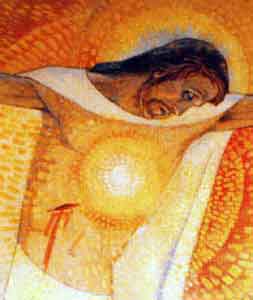 '
'
'
Here is the first posting of a series that
Michael Dubruiel wrote entitled
73 Steps to Spiritual Communion with God. These steps are drawn from Saint Benedict's
Rule, the reflections are his own. Originally published in 2003.
This is the first part of step one:
(1) In the first place to love the Lord God with the whole heart, the whole soul, the whole strength...Benedict begins what will be a list of simple practices with one that is above all others, the practice of a complete love of God. A love that is one that desires only God, symbolized by the heart; a love that meditates only on God symbolized by the soul; and a love that focuses all of its energy on exhibiting this love of God symbolized by my strength.
If we are honest, this is exactly what we all fear the most, an unconditional surrender of all to God.
I remember when I taught high school theology at a Jesuit School the response that I would always receive from my students whenever I would present to them Saint Ignatius’ First Principle and Foundation which teaches that the purpose of our lives is to know, love and serve God and that everything else is secondary and is here to help us attain that purpose. Most of the Catholic students would become outraged, usually a few non-Catholic students in some cases nonbelievers would say it made perfect sense to them.
The issue of acceptance of this foundational attitude in spirituality is one of trust. Do we trust that God wants what is best for us. In our fears is an agenda that thinks that God will only get in the way of our happiness. Unfortunately it takes a long time for most of us to realize that what we think we want changes almost hourly.
We need direction in our lives. Our lives need to be oriented in some direction. The question is where will we seek that guidance?
The map pocket of my car is full of maps. The maps are only helpful to me if I know what my ultimate destination is and if I know where I am at the present moment. Recently while driving in a strange city with the map opened to that city, I knew where I wanted to go but had no idea where I was. Someone in the neighborhood I was in had torn down all of the street signs. I continued to travel up the street until finally I was able to locate a street sign.
Our lives can be the same confused mess that I felt on that day driving aimlessly up and down a city street. Who are we? Why are we here?
The Baltimore Catechism gave us a simple answer. We are here because God loves us. That is the starting point of the spiritual quest is to believe wholeheartedly that we are loved. A subtle but key ingredient to the fear that we feel in surrendering to God is that we do not believe that we are loved but fear that we are hated.
I remember as a child whenever I would be on my way to confession on a Saturday afternoon secretly fearing that God would try to see to it that I was killed before I arrived there. Where this fear came from I do not know, but it was real and it was only much later that I finally realized that God was the redeemer not the enemy.
The attitude we have toward God is all-important if we are to love God with our whole being. We must believe that God loves us first and want what is best for us. It is hard to do anything but love God with our whole being if we believe that God loves us. In an older translation of the New American Bible the words of Jesus are applicable here, “Fear is useless, what is needed is trust.” The words of the supplicant must be our words also, “I believe Lord, help my unbelief.”
It may seem obvious that the first step that anyone would make toward perfect communion with God is to place God at the very center, but how many times we look everywhere else for the way? If we wish to have communion with God we must enter into God’s presence and offer our entire being to God.
Most of us have given the allegiance of part of our being to God but not the whole. I can say that intellectually I have always believed in God and placed my soul in varying degrees to the love of God, but my heart well that is another story. There have been countless times that what my heart has desired has been anything but God. I have thought that this or that would make me truly happy and I have gone down many paths ignoring God in the process.
If I believe that God has created me and knows me best and what is in my ultimate interest, I will seek God above all things.
I still remember the first time I encountered the simple engraving over the entrance of the Monastery of Our Lady of Gethsemane in Kentucky. I stood there for some time looking at the simple words etched in stone that seemed bigger than life, “GOD ALONE.” There was something shocking about the simplicity of the statement, but at the same time a truth that touched me deeply.
In the end when our life is failing nothing else will matter. If we can acknowledge that at this point why not see the wisdom of putting God first in everything today? The message of Benedict’s first step is to put God first in all things and to do so lovingly.











